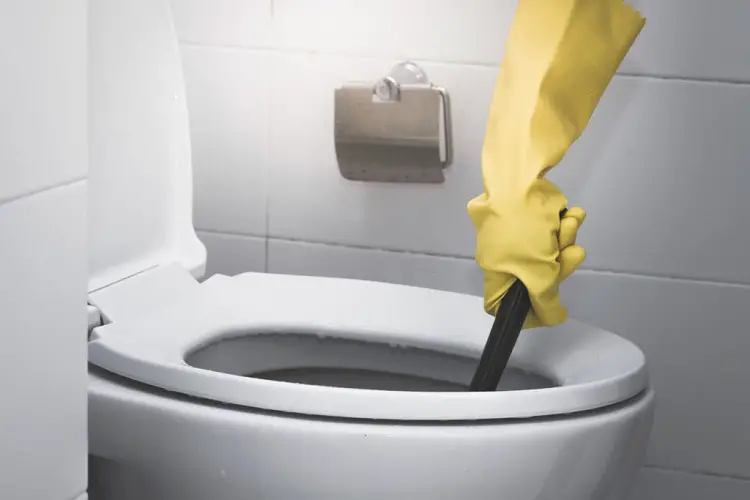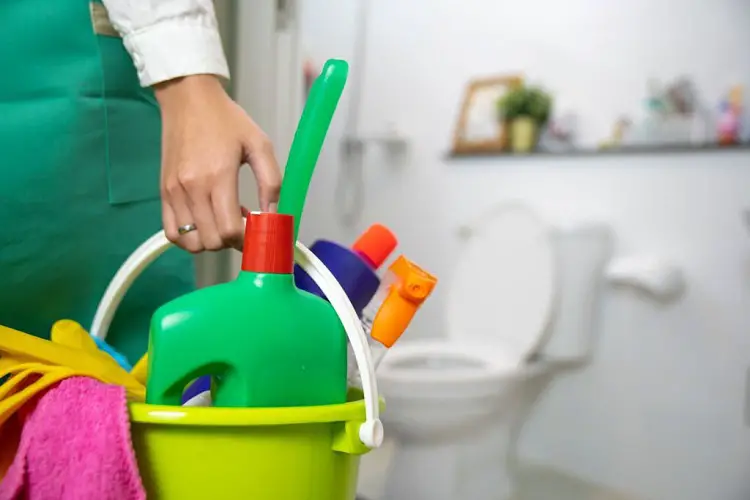Baby wipes are tough to clean properly without breaking into pieces, which is a plus.
Mothers do not have to deal with cleaning pieces of wipes after use, like in the case of tissue papers, where most of the pieces are left in the cleaned area.
Some adverts show wipes are “flushable”, which is true, but they are not biodegradable.
If you’ve been wondering how to dissolve baby wipes in the toilet, here are tips that can help you with a toilet clogged up by baby wipes.
Are Baby Wipes Flushable?
Baby wipes are flushable since they’re small and can get soaked in water. But they’re not dissolvable in water like paper.
It can take up to years for one baby wipe to dissolve completely, whereas a paper will take only a few minutes, making the whole idea of baby wipes being flushable flawed.
This is the trick many companies use when advertising their products to parents because it is easy to get carried away by hearing “flushable wipes,” assuming that flushable here also means dissolvable.
Baby wipes are made of different unwoven fibers of other materials, mostly cotton and plastic resins.
The cotton, which is the natural part, may weaken with time and disintegrate, but plastic is non-biodegradable, making it undissolvable. The best way to properly dispose of used baby wipes is by throwing them in a bin.
What Happens When You Flush Baby Wipes?
Baby wipes are not chemicals, so you will not get any chemical reaction when you flush them down your toilet.
However, the results of consistently flushing baby wipes down your toilet will lead to clogging.
Buying flushable wipes is not enough reason to flush them down your toilet, and if you think about it, not only baby wipes are flushable.
Sanitary pads, tampons, and some sizable baby diapers are flushable also, but you don’t have to go about tucking all of these down your toilet because they’re flushable. You should only flush what can easily dissolve down your toilet in the shortest time possible.
Flushing baby wipes down your toilet can lead to a build-up of the fatberg, a mass of mumbled-up grease, dirt, fat, diapers, and other non-biodegradable materials.
This can cause a blockage in the drainage system and eventually cause a disease outbreak in the community if not dealt with immediately.
You may think a one-time flush won’t harm anyone, but if every parent who bought flushable wipes decided to flush it, it’ll amass into what may end up causing a disease or huge plumping expenses that you could have avoided.
How To Dissolve Baby Wipes in the Toilet

Contrary to the popular assertion that baby wipes cannot be dissolved by any substance; there are a few substances that you can use to dissolve baby wipes in the toilet.
If you’re dealing with a toilet clogged with baby wipes and wondering how to dissolve baby wipes in the toilet, here is one of the most common substances that you can use to dissolve baby wipes; sulphuric acid.
Sulphuric acid is a powerful and concentrated acid that can dissolve many things, including human flesh and bones. It is highly corrosive and dangerous to the human body.
This is the only common substance that can dissolve baby wipes in the toilet.
Still, it is not advisable to use because a single mistake can cause a lot of damage, including human lives, making the thought of how to dissolve baby wipes in the toilet far-fetched.
If you’re courageous enough to use sulphuric acid in dissolving baby wipes in the toilet, ensure to wear protective gears that cover your eyes, arms, and nose.
Keep the rest of the family, especially children, away from the scene and avoid mixing it with other chemicals or cleaning agents to prevent any reaction.
Usually, when sulphuric acid comes in contact with other chemical substances, it gives off a powerful and offensive odor that can be choking; therefore, before pouring it down, ensure that the toilet is well-ventilated.
Alternatively, instead of exposing yourself and your family to the dangers of sulphuric acid, it is better to opt for other simpler and safer ways of unclogging your toilet using the following tools.
A Plunger
A plunger is a familiar tool in many households. It uses pressure to suck out items stuck in the toilet or sink. It has a flexible rubber head attached to a handle.
If you are unfamiliar with how a plunger is used, it can be a little challenging to take out all the wipes that may be clogging the toilet, but with more pressure, the more you pull up the plunger, the more the pressure drags out the wipes.
A Stick
This might not sound ideal, but it is safer than using sulphuric acid, and in cases where there’s no plumber nearby or no plunger in sight, it can be a good substitute.
A long enough stick to reach the depth where the wipes are clogged will go a long way. If you can see the wipes, you may not need such a long stick to drag it out.
Gloves
Using rubber gloves is another way to safely pull out the wipes if you can’t get a plumber to do it for you.
This may not sit well with some people considering that the toilet is not the most hygienic of places around the house, but proper disinfectants before and after pulling out the wipes will get rid of any germs and whatever harm they may give.
Call a Plumber
This is the ultimate solution to any plumbing issue around the house. Plumbers are trained to do it, be it a broken pipe, leaking sinks, or unclogging your toilets.
The only time you should consider substituting a plumber for other ways should be when you’re sure it is a minor issue you can handle without leading to more damage.
Other Natural Ways To Clear A Clogged Toilet
If you don’t want to use bleach or sulphuric acid or have money to hire a plumber, you can try releasing the clog with home cleaners.
But be careful, as mild cleaners can become deadly if mixed incorrectly.
Create a solution with one cup of baking soda, two cups of hot water, and two cups of white vinegar. Pour the solution into your toilet.
While doing this, ensure the water is not too warm; if so, the porcelain will crack. Wait for 30 minutes to pass before flushing.
Read: 10 creative ways to childproof toilet paper roll from child
FAQs
How many baby wipes does it take to block the toilet?
Flushing one baby wipes down the toilet definitely cannot block the toilet.
Sadly, one can’t know how many will block your toilet because once you get comfortable flushing it down, you can lose count of the number of undissolved wipes hanging in your pipes, so it is better to avoid it.
How long does it take for baby wipes to dissolve?
Baby wipes are not made with biodegradable materials. Hence, they do not rot or decompose.
It is hard to tell precisely the number of weeks or months it’ll take to dissolve, but some researchers believe it’ll take about 100 years for wet wipes to dissolve.
How can I know if my sewage is blocked?
One of the signs is that your toilet will flush sluggishly since the drain is full.
Second, a blocked sewage system will produce a bad smell in your house since sewage will decompose in pipes instead of your septic tank.
Even worse, raw sewage will begin to flow back into your home. Over the septic tank, the grass will grow greener, and you may notice a water patch in the yard.
How can I remove the wipes clogging the septic tank?
A professional plumber is an expert in pumping out such clogs in toilets and septic tanks and cleaning them up after unclogging.
You can use sulfuric acid drain cleaners to dissolve wipes in a septic tank, but ensure you do this with professional guidance to avoid escalating the situation.
We recommend you seek their service every few years, even if you have no clogs. When doing this, you won’t have to worry about how to dissolve baby wipes in the toilet.
In addition, we recommend you don’t throw baby wipes in the toilet.
What is the Best Way To Dispose of Baby Wipes?
Throwing baby wipes in the trash can is the best way to dispose of baby wipes. By doing this, you won’t have to worry about how to dissolve baby wipes in the toilet.
Therefore, for a safe and comfortable home, you should not dispose of baby wipes in the toilet.
Why Do Children Dump Objects Down The Toilet?
It is common for young children to be apprehensive when potty training.
It may surprise and disturb or fascinate them indefinitely to see their excrement flush down the toilet after them.
Some children may be eager to flush any items down the toilet. Some parents have no idea that the hole through which their waste is flushed is too small to fit in many objects and how big the pipelines transport their waste.
This makes children flush any kind variety of materials.
What Happens If You Flush Plastic?
You may think flushing a small plastic wrapper is safe, but this is not true. You should never flush any plastic down the toilet since these small pieces could add to a larger problem.
The resulting drainage problems will harm not only your home but the ecosystem as well.
Conclusion
If you’re thinking of how to dissolve baby wipes in the toilet, there’s one common way; other ways only involve pulling the wipes out.
Other articles outrightly put it that there are no ways to dissolve baby wipes because of how harmful the wrong use of sulphuric acid can be.
However, in this article, other suggestions have been given alongside the common way of dissolving baby wipes using sulphuric acid for cases where you’re unsure which one to use.
